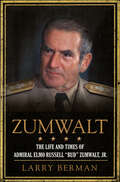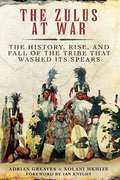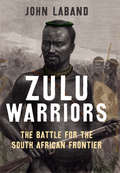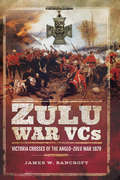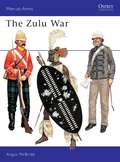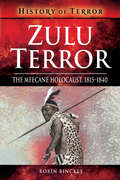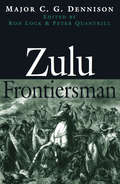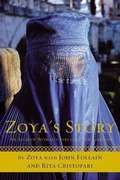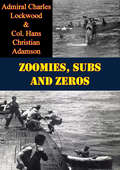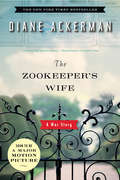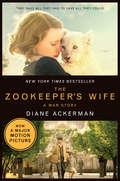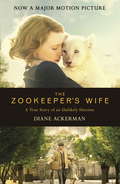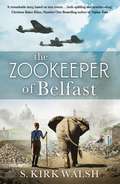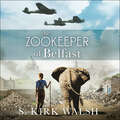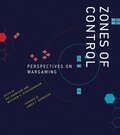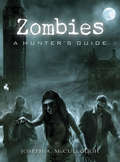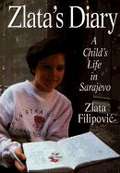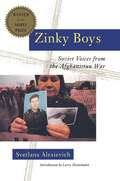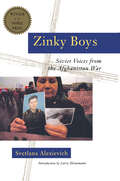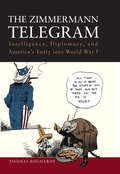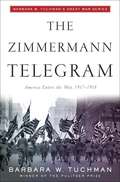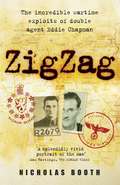- Table View
- List View
Zumwalt: The Life and Times of Admiral Elmo Russell "Bud" Zumwalt, Jr.
by Larry BermanAdmiral Elmo Russell Zumwalt, Jr., the charismatic chief of naval operations (CNO) and "the navy's most popular leader since WWII" (Time), was a man who embodied honor, courage, and commitment. In a career spanning forty years, he rose to the top echelon of the U.S. Navy as a commander of all navy forces in Vietnam and then as CNO from 1970 to 1974. His tenure came at a time of scandal and tumult, from the Soviets' challenge to the U.S. for naval supremacy and a duplicitous endgame in Vietnam to Watergate and an admirals' spy ring.Unlike many other senior naval officers, Zumwalt successfully enacted radical change, including the integration of the most racist branch of the military—an achievement that made him the target of bitter personal recriminations. His fight to modernize a technologically obsolete fleet pitted him against such formidable adversaries as Henry Kissinger and Hyman Rickover. Ultimately, Zumwalt created a more egalitarian navy as well as a smaller modernized fleet better prepared to cope with a changing world.But Zumwalt's professional success was marred by personal loss, including the unwitting role he played in his son's death from Agent Orange. Retiring from the service in 1974, Zumwalt spearheaded a citizen education and mobilization effort that helped thousands of Vietnam veterans secure reparations. That activism earned him the nation's highest civilian honor, the Presidential Medal of Freedom. Today Zumwalt's tombstone at the U.S. Naval Academy is inscribed with one word: "Reformer." Admiring yet evenhanded, Larry Berman's moving biography reminds us what leadership is and pays tribute to a man whose life reflected the best of America itself.
The Zulus at War: The History, Rise, and Fall of the Tribe That Washed Its Spears
by Adrian Greaves Xolani MkhizeBy tracing the long and turbulent history of the Zulus from their arrival in South Africa and the establishment of Zululand, The Zulus at War is an important and readable addition to this popular subject area. It describes the violent rise of King Shaka and his colorful successors under whose leadership the warrior nation built a fearsome fighting reputation without equal among the native tribes of South Africa. It also examines the tactics and weapons employed during the numerous intertribal battles over this period. They then became victims of their own success in that their defeat of the Boers in 1877 and 1878 in the Sekunini War prompted the well-documented British intervention. Initially the might of the British empire was humbled as never before by the shock Zulu victory at Isandlwana but the 1879 war ended with the brutal crushing of the Zulu Nation. But, as Adrian Greaves reveals, this was by no means the end of the story. The little known consequences of the division of Zululand, the Boer War, and the 1906 Zulu Rebellion are analyzed in fascinating detail. An added attraction for readers is that this long-awaited history is written not just by a leading authority but, thanks to the coauthor’s contribution, from the Zulu perspective using much completely fresh material.Skyhorse Publishing, as well as our Arcade imprint, are proud to publish a broad range of books for readers interested in history--books about World War II, the Third Reich, Hitler and his henchmen, the JFK assassination, conspiracies, the American Civil War, the American Revolution, gladiators, Vikings, ancient Rome, medieval times, the old West, and much more. While not every title we publish becomes a New York Times bestseller or a national bestseller, we are committed to books on subjects that are sometimes overlooked and to authors whose work might not otherwise find a home.
Zulu Warriors:The Battle for the South African Frontier
by John LabandToward the end of the nineteenth century, the British embarked on a concerted series of campaigns in South Africa. Within three years they waged five wars against African states with the intent of destroying their military might and political independence and unifying southern Africa under imperial control. This is the first work to tell the story of this cluster of conflicts as a single whole and to narrate the experiences of the militarily outmatched African societies.<P> Deftly fusing the widely differing European and African perspectives on events, John Laband details the fateful decisions of individual leaders and generals and explores why many Africans chose to join the British and colonial forces. The Xhosa, Zulu, and other African military cultures are brought to vivid life, showing how varying notions of warrior honor and manliness influenced the outcomes for African fighting men and their societies.
Zulu War VCs: Victoria Crosses of the Anglo-Zulu War, 1879
by James W. BancroftThe Anglo-Zulu War lasted only six months in 1879, but in that relatively short time twenty-three men were awarded the Victoria Cross for gallantry under most trying and dangerous circumstances. Zulu warriors gave no mercy and expected none in return, yet half of the awards were given to men who went back into the midst of fierce fighting to rescue stranded comrades, well-aware that they risked suffering a particularly brutal death.Two men received posthumous awards for their efforts to save the Queens color of their regiment after the disastrous engagement against overwhelming numbers of warriors at Isandlwana, and perhaps the most famous of all awards of the Victoria Cross were the eleven gained for the immortal defence of Rorkes Drift, the battle brought back to the public consciousness by the motion picture _Zulu!_The conflict has never left the publics imagination, and continues to stir hot debate among military historians and enthusiasts.With information compiled over four decades by James W. Bancroft, a well-known and respected historian and author of several publications on the subject, this book brings together more information about the men than has ever before been collected together in one publication.
The Zulu War
by Angus McbrideBy the end of the nineteenth century the fame of the Zulu was world-wide, and their army was one of the few non-European military organizations to have become the subject of serious historical study. Their very name is still synonymous with bravery, discipline and military skill. This excellent addition to Osprey's Men-at-Arms series tells the story of the Zulus at war, from their rise to unrivalled power under the fearsome Shaka to the final devastating defeat against the British at Ulundi, detailing Zulu weapons and tactics, and the famous battles in which they fought.
Zulu Terror: The Mfecane Holocaust, 1815–1840 (History of Terror)
by Robin BinckesThe historian and author of The Great Trek recounts the devastating period of violence among indigenous peoples in early 19th century southern Africa. From 1815 to 1840, southeastern Africa experienced a devastating period of warfare between the Zulus, the Matabele, and other indigenous peoples. Though the causes of the unrest—which the Zulu called the Mfecane—are still debated by historians, we know that hundreds of thousands of lives lost. Some estimate the total number of deaths to be near two million. At the center of the turmoil was the Zulu Kingdom and its King Shaka, whose wars of expansion sparked mass migrations among smaller tribes. One of Shaka&’s lieutenants, Mzilikazi Khumalo, escaped execution and began a trail of destruction from Zululand north to the Highveld. Refugees from Mzilikazi&’s warpath then formed their own alliance—including with the Dutch-speaking Voortrekkers, arriving on their own &“Great Trek&” to escape British control. Finally defeated in 1836 by the Voortrekkers in a nine-day battle, Mzilikazi and his followers crossed the Limpopo River and founded the kingdom of the Matabele in what is now Zimbabwe.
Zulu Frontiersman
by Major C. G. DennisonIt was said of George Dennison that he had seen more active service in southern Africa than any other living man. An eminent soldier cast from a colonial mould of bitter experience, rather than of a formal military education, he was also a frontiersman equal in standing to any legendary figure of the American West. His military career saw him rise from an uncouth trooper with the Bloemfontein Rangers to, fifty years later, a distinguished officer whose advice was sought by the likes of Lord Kitchener, Sir Garnet Wolseley and other British military names of fame. During this time Dennison encountered many foes, some he would have known as neighbours, or men who had lately been his comrades-in-arms. He fought against Afrikaners, Dutchmen, Voortrekkers and the Boers. His black foes were also diverse; the stealthy Xhosa of the eastern Cape; the battle-axe wielding Basutos from their lofty kingdom in the clouds; the Transvaal baPedi, the masters of fortification, and most impressive of all, the amaZulu warriors of King Cetshwayo. In Zulu Frontiersman, Dennison recounts his remarkable exploits in rich and lively prose. Originally published in 1904 in abridged form (under the title A Fight to the Finish) his memoirs have now been expertly reworked by Ron Lock and Peter Quantrill in order to reinstate some of the fascinating details missing from the earlier published account, including for example Dennison's involvement in and dramatic escape from the battle of Hlobane.
Zoya's Story: An Afghan Woman's Struggle for Freedom
by Zoya John Follain Rita CristofariZoya's Story is a young woman's searing account of her clandestine war of resistance against the Taliban and religious fanaticism at the risk of her own life. An epic tale of fear and suffering, courage and hope, Zoya's Story is a powerful testament to the ongoing battle to claim human rights for the women of Afghanistan. Though she is only twenty-three, Zoya has witnessed and endured more tragedy and terror than most people do in a lifetime. Zoya grew up during the wars that ravaged Afghanistan and was robbed of her mother and father when they were murdered by Muslim fundamentalists. Devastated by so much death and destruction, she fled Kabul with her grandmother and started a new life in exile in Pakistan. She joined the Revolutionary Association of the Women of Afghanistan, which challenged the crushing edicts of the Taliban government, and she made dangerous journeys back to her homeland to help the women oppressed by a system that forced them to wear the stifling burqa, condoned public stoning or whipping if they ventured out without a male chaperon, and forbade them from working. Zoya is our guide, our witness to the horrors perpetrated by the Taliban and the Mujahideen "holy warriors" who had defeated the Russian occupiers. She helped to secretly film a public cutting of hands in a Kabul stadium and to organize covert literacy classes, as schooling-branded a "gateway to Hell" -- was forbidden to girls. At an Afghan refugee camp she heard tales of heartrending suffering and worked to provide a future for families who had lost everything. The spotlight focused on Afghanistan after the New York and Washington terrorist attacks highlights the conditions of repression and fear in which Afghan women live and makes Zoya's Story utterly compelling. This is a memoir that speaks louder than the images of devastation and outrage; it is a moving message of optimism as Zoya struggles to bring the plight of Afghan women to the world's attention.
Zoya: An epic, unputdownable read from the worldwide bestseller
by Danielle SteelTHE WORLD'S FAVOURITE STORYTELLERNEARLY ONE BILLION COPIES SOLD One woman's odyssey through a century of turmoil . . . St Petersburg: one famous night of violence in the October Revolution ends the lavish life of the Romanov court forever - shattering the dreams of young Countess Zoya Ossupov.Paris: under the shadow of the Great War, émigrés struggle for survival as taxi drivers, seamstresses and ballet dancers. Zoya flees there in poverty - and leaves in glory.America: a glittering world of flappers, fast cars and furs in the Roaring Twenties; a world of comfort and café society that would come crashing down without warning. An epic and romantic tale from one of the best-loved writers of all time. Perfect for fans of Penny Vincenzi, Lucinda Riley and Maeve BinchyPRAISE FOR DANIELLE STEEL:'Emotional and gripping . . . I was left in no doubt as to the reasons behind Steel's multi-million sales around the world' DAILY MAIL'Danielle Steel is undeniably an expert' NEW YORK TIMES
Zoomies, Subs And Zeros
by Admiral Charles Lockwood Col. Hans Christian AdamsonThe exploits of the Submarine Rescue League, which had the job of picking up American flyers shot down while attacking objectives in the Pacific.'In writing this book, the authors had a triple purpose.First, to write the superbly human history of the Submarine Lifeguard League while those who participated in its creation and in its splendid work are still among us to tell that story. It is a chapter of Naval and Air Force operations in the Pacific that richly deserves preservation.Second, to convey to submariners whose vessels took part in the saving of the lives of hundreds of Air Force, Navy, and Marine Corps men an essential picture of the overall scope of their activities; as well as to give aviators whose lives were saved by submarines--and their families--a view of the far-flung operations established for snatching airmen from Japs as well as from death at sea.There remains one more reason for the writing of this book and, perhaps, it is, after all, the most important: namely, to impress upon those who have a voice in such matters at defense and Congressional levels that with new long-range planes and nuclear powered submarines, the lifesaving know-how acquired by submarine and air commanders through bitter and time-consuming experiences should be preserved for future generations of submariners and airmen.'-Author's Preface.
The Zookeeper's Wife: A War Story (Thorndike Biography Ser. #0)
by Diane Ackerman<P>The New York Times bestseller: a true story in which the keepers of the Warsaw Zoo saved hundreds of people from Nazi hands. After their zoo was bombed, Polish zookeepers Jan and Antonina Zabinski managed to save over three hundred people from the Nazis by hiding refugees in the empty animal cages. With animal names for these "guests," and human names for the animals, it's no wonder that the zoo's code name became "The House Under a Crazy Star." <P>Best-selling naturalist and acclaimed storyteller Diane Ackerman combines extensive research and an exuberant writing style to re-create this fascinating, true-life story--sharing Antonina's life as "the zookeeper's wife," while examining the disturbing obsessions at the core of Nazism. <P><b>Winner of the 2008 Orion Award.</b> <P><b>A New York Times Bestseller</b>
The Zookeeper's Wife: A War Story (Movie Tie-in Editions #0)
by Diane Ackerman<P>The movie The Zookeeper’s Wife, based on the New York Times bestselling book, opens March 2017. <P>1939: the Germans have invaded Poland. The keepers of the Warsaw zoo, Jan and Antonina Zabinski, survive the bombardment of the city, only to see the occupiers ruthlessly kill many of their animals. The Nazis then carry off the prized specimens to Berlin for their program to create the “purest” breeds, much as they saw themselves as the purest human race. Opposed to all the Nazis represented, the Zabinskis risked their lives by hiding Jews in the now-empty animal cages, saving as many as three hundred people from extermination. <P>Acclaimed, best-selling author Diane Ackerman, fascinated both by the Zabinskis’ courage and by Antonina’s incredible sensitivity to all living beings, tells a moving and dramatic story of the power of empathy and the strength of love. <P>A Focus Features release, it is directed by Niki Caro, written by Angela Workman.
The Zookeeper's Wife: An unforgettable true story, now a major film (Movie Tie-in Editions Ser. #0)
by Diane AckermanIn war-torn Warsaw, a zookeeper and his wife refuse to surrender... Now a major motion picture starring Jessica Chastain and Daniel Brühl, Diane Ackerman's The Zookeeper's Wife is based on a remarkable true story of bravery and sanctuary during World War II. Perfect for fans of Lion and Hidden Figures. 'I can't imagine a better story or storyteller. The Zookeeper's Wife will touch every nerve you have' -Jonathan Safran Foer, author of Everything is Illuminated When Germany invades Poland, Luftwaffe bombers devastate Warsaw and the city's zoo along with it. With most of their animals killed, or stolen away to Berlin, zookeepers Jan and Antonina Zabinski begin smuggling Jews into the empty cages.As the war escalates Jan becomes increasingly involved in the anti-Nazi resistance. Ammunition is buried in the elephant enclosure and explosives stored in the animal hospital. Plans are prepared for what will become the Warsaw uprising. Through the ever-present fear of discovery, Antonina must keep her unusual household afloat, caring for both its human and animal inhabitants - otters, a badger, hyena pups, lynxes - as Europe crumbles around them.Written with the narrative drive and emotional punch of a novel, The Zookeeper's Wife is a remarkable true story. It shows us the human and personal impact of war - of life in the Warsaw Ghetto, of fighting in the anti-Nazi resistance. But more than anything it is a story of decency and sacrifice triumphing over terror and oppression. What readers are saying about The Zookeeper's Wife: 'Beautifully and sensitively written - a must read''An adventure that inspires''Both horrifying and endearing on a scale I've not experienced in years''A story that will haunt you forever''Haunting, life affirming, sad, and inspiring'
The Zookeeper of Belfast: A heart-stopping WW2 historical novel based on an incredible true story
by S. Kirk WalshAs the bombs rain down on the city, Belfast's first ever female zookeeper must fight to save the baby elephant in her charge in this gripping, uplifting tale based on a true story.1941. With the men away fighting, animal-lover Hettie Quin is made Belfast Zoo's first ever female zookeeper. She is put in charge of Violet, a three-year-old Indian elephant, and they soon form a special bond. With Violet at her side, Hettie can almost escape the grim reality of her life: the father who has abandoned her family; the sister who recently died; the war that's raging hundreds of miles away.But the devastation of war is closer than she thought. When the bombs begin to rain down on the city, Hettie must gather all her courage to protect those she loves the most. Can she save Violet - and get through unscathed herself?Based on a true story, The Zookeeper of Belfast is a gripping and uplifting tribute to what one woman's courage and tenacity can achieve in the most dire of circumstances - perfect for fans of Heather Morris, Natasha Lester, Kate Furnivall, Mandy Robotham and Fiona Valpy.Praise for THE ZOOKEEPER OF BELFAST:'Walsh delivers a turbulent portrait of life in a divided city . . . A unique perspective of a country at war and the lengths people will go for those they love.' - Kirkus Reviews'Sensitively rendered and finely drawn, this remarkable story, based on true events, is both uplifting and heartbreaking.' - Christina Baker Kline, #1 New York Times bestselling author of Orphan Train'Walsh has written a novel of deep affection and knife-edge suspense. A brilliant debut.' - Margot Livesey, author of The Boy in The Field'An elephant, a young zookeeper, the city of Belfast, bombings, and an IRA member are the improbable characters in this captivating and intimately felt novel that tells the story of a young woman's uncommon devotion and courage under fire.' - Lily Tuck, author of Sisters'A zoo in wartime Belfast and a young woman's fierce love for the elephant in her care come vividly to life in this beautiful, beguiling, and atmospheric debut novel.' - Dominic Smith, author of The Last Painting of Sara de Vos·Cinematic in scope and brimming with emotion, this is a soaring work of historical imagination.' - Karen Olsson, author of All the Houses
The Zookeeper of Belfast: A heart-stopping WW2 historical novel based on an incredible true story
by S. Kirk WalshA stunning World War Two novel for fans of Natasha Lester, Heather Morris, Kate Furnivall, Mandy Robotham, based on a true story.As the bombs rain down on the city, Belfast's first ever female zookeeper must fight to save the baby elephant in her charge in this gripping, uplifting tale based on a true story.1941. With the men away fighting, animal-lover Hettie Quin is made Belfast Zoo's first ever female zookeeper. She is put in charge of Violet, a three-year-old Indian elephant, and they soon form a special bond. With Violet at her side, Hettie can almost escape the grim reality of her life: the father who has abandoned her family; the sister who recently died; the war that's raging hundreds of miles away.But the devastation of war is closer than she thought. When the bombs begin to rain down on the city, Hettie must gather all her courage to protect those she loves the most. Can she save Violet - and get through unscathed herself?Based on a true story, The Zookeeper of Belfast is a gripping and uplifting tribute to what one woman's courage and tenacity can achieve in the most dire of circumstances - perfect for fans of Heather Morris, Natasha Lester, Kate Furnivall, Mandy Robotham and Fiona Valpy.Praise for THE ZOOKEEPER OF BELFAST:'Walsh delivers a turbulent portrait of life in a divided city . . . A unique perspective of a country at war and the lengths people will go for those they love.' - Kirkus Reviews'Sensitively rendered and finely drawn, this remarkable story, based on true events, is both uplifting and heartbreaking.' - Christina Baker Kline, #1 New York Times bestselling author of Orphan Train'Walsh has written a novel of deep affection and knife-edge suspense. A brilliant debut.' - Margot Livesey, author of The Boy in The Field'An elephant, a young zookeeper, the city of Belfast, bombings, and an IRA member are the improbable characters in this captivating and intimately felt novel that tells the story of a young woman's uncommon devotion and courage under fire.' - Lily Tuck, author of Sisters'A zoo in wartime Belfast and a young woman's fierce love for the elephant in her care come vividly to life in this beautiful, beguiling, and atmospheric debut novel.' - Dominic Smith, author of The Last Painting of Sara de Vos·Cinematic in scope and brimming with emotion, this is a soaring work of historical imagination.' - Karen Olsson, author of All the Houses(P) 2021 Hodder & Stoughton Ltd
Zones of Control: Perspectives on Wargaming (Game Histories)
by Pat Harrigan Matthew G. KirschenbaumExaminations of wargaming for entertainment, education, and military planning, in terms of design, critical analysis, and historical contexts.Games with military themes date back to antiquity, and yet they are curiously neglected in much of the academic and trade literature on games and game history. This volume fills that gap, providing a diverse set of perspectives on wargaming's past, present, and future. In Zones of Control, contributors consider wargames played for entertainment, education, and military planning, in terms of design, critical analysis, and historical contexts. They consider both digital and especially tabletop games, most of which cover specific historical conflicts or are grounded in recognizable real-world geopolitics. Game designers and players will find the historical and critical contexts often missing from design and hobby literature; military analysts will find connections to game design and the humanities; and academics will find documentation and critique of a sophisticated body of cultural work in which the complexity of military conflict is represented in ludic systems and procedures.Each section begins with a long anchoring chapter by an established authority, which is followed by a variety of shorter pieces both analytic and anecdotal. Topics include the history of playing at war; operations research and systems design; wargaming and military history; wargaming's ethics and politics; gaming irregular and non-kinetic warfare; and wargames as artistic practice.ContributorsJeremy Antley, Richard Barbrook, Elizabeth M. Bartels, Ed Beach, Larry Bond, Larry Brom, Lee Brimmicombe-Wood, Rex Brynen, Matthew B. Caffrey, Jr., Luke Caldwell, Catherine Cavagnaro, Robert M. Citino, Laurent Closier, Stephen V. Cole, Brian Conley, Greg Costikyan, Patrick Crogan, John Curry, James F. Dunnigan, Robert J. Elder, Lisa Faden, Mary Flanagan, John A. Foley, Alexander R. Galloway, Sharon Ghamari-Tabrizi, Don R. Gilman, A. Scott Glancy, Troy Goodfellow, Jack Greene, Mark Herman, Kacper Kwiatkowski, Tim Lenoir, David Levinthal, Alexander H. Levis, Henry Lowood, Elizabeth Losh, Esther MacCallum-Stewart, Rob MacDougall, Mark Mahaffey, Bill McDonald, Brien J. Miller, Joseph Miranda, Soraya Murray, Tetsuya Nakamura, Michael Peck, Peter P. Perla, Jon Peterson, John Prados, Ted S. Raicer, Volko Ruhnke, Philip Sabin, Thomas C. Schelling, Marcus Schulzke, Miguel Sicart, Rachel Simmons, Ian Sturrock, Jenny Thompson, John Tiller, J. R. Tracy, Brian Train, Russell Vane, Charles Vasey, Andrew Wackerfuss, James Wallis, James Wallman, Yuna Huh Wong
Zombies
by Joseph McculloughThe dead have always stalked the dark corners of the earth. Since World War II, the number of zombie outbreaks has increased every year, while governments desperately try to cover up the facts. Zombies: A Hunter's Guide contains all of the information necessary to recognize and combat this growing threat. Beginning with an explanation of the historical origins of zombies, it follows their history straight through to the threat they pose to the world today. All varieties of zombie are catalogued and examined, giving their strengths and weakness, with a special emphasis on recognition and elimination. Finally, the book covers the tactics and equipment used in zombie fighting. Accompanied by numerous full-color reconstructions to help with identification, this book is a must for anyone on the frontlines of the Zombie Wars.From the Trade Paperback edition.
Zlata's Diary: A Child's Life in Sarajevo
by Zlata Filipovic Christina Pribichevich-ZoricThis journal entry represents Zlata's insightful writing and the translators skill: "Thursday, October 14, 1993 Dear Mimmy, Those lunatics up in the hills must have read what I wrote about the shooting yesterday. They want to show me that they're still around. They went SHOOTING today. Shells fell around the market-place, and we don't know how Grandma and Grand-dad are. Poor things. These lunatics haven't just stolen from us our childhood, they've stolen from my grandparents and other old people a peaceful old age. They're not letting them live out the rest of their lives in peace. They had to ruin that too. I didn't have classes or music school today. They sent us home, so I'll spend the whole day at home reading, playing the piano, spending some time with Nejra and Haris. I was supposed to go to Mirna's today, but they spoiled that for me. I didn't tell you, Mimmy, that you're about to go out into the world. You're going to be published abroad. I allowed it, so you could tell the world what I wrote to you. I wrote to you about the war, about myself and Sarajevo in the war, and the world wants to know about it. I wrote what I felt, saw and heard, and now people outside of Sarajevo are going to know it. Have a good journey into the world. Your Zlata" A fine book for a book report. Teens sensitive to cruelty will want to share this diary with parents. This was a horrific piece of history.
Zinky Boys: Soviet Voices From The Afghanistan War
by Svetlana AlexievichWinner of the Nobel Prize: “For her polyphonic writings, a monument to suffering and courage in our time.” ―Swedish Academy, Nobel Prize citation<P><P> From 1979 to 1989 a million Soviet troops engaged in a devastating war in Afghanistan that claimed 50,000 casualties―and the youth and humanity of many tens of thousands more. Creating controversy and outrage when it was first published in the USSR―it was called by reviewers there a “slanderous piece of fantasy” and part of a “hysterical chorus of malign attacks”―Zinky Boys presents the candid and affecting testimony of the officers and grunts, nurses and prostitutes, mothers, sons, and daughters who describe the war and its lasting effects. What emerges is a story that is shocking in its brutality and revelatory in its similarities to the American experience in Vietnam. The Soviet dead were shipped back in sealed zinc coffins (hence the term “Zinky Boys”), while the state denied the very existence of the conflict. Svetlana Alexievich brings us the truth of the Soviet-Afghan War: the beauty of the country and the savage Army bullying, the killing and the mutilation, the profusion of Western goods, the shame and shattered lives of returned veterans. Zinky Boys offers a unique, harrowing, and unforgettably powerful insight into the realities of war.<P><P> Translated by Larry Heinemann.
Zinky Boys: Soviet Voices From The Afghanistan War
by Svetlana AlexievichFrom the winner of the Nobel Prize for work that stands as "a monument to suffering and courage in our time" (Swedish Academy). Before the United States' invasion, a million Soviet troops fought a devastating war in Afghanistan that claimed 50,000 casualties—and the youth and humanity of many tens of thousands more. The Soviet Union talked about a "peacekeeping" mission, while the dead were shipped back in zinc-lined coffins. In this new translation, Zinky Boys weaves together the candid and affecting testimony of the officers and grunts, doctors and nurses, mothers, sons, and daughters who describe the war and its lasting effects. A "masterpiece of reportage" (Timothy Snyder, New York Review of Books) emerges of harrowing and unforgettable insight into war.
The Zimmermann Telegram
by Thomas BoghardtBy the winter of 1916/17, World War I had reached a deadlock. While the Allies commanded greater resources and fielded more soldiers than the Central Powers, German armies had penetrated deep into Russia and France, and tenaciously held on to their conquered empire. Hoping to break the stalemate on the western front, the exhausted Allies sought to bring the neutral United States into the conflict.A golden opportunity to force American intervention seemed at hand when British naval intelligence intercepted a secret telegram detailing a German alliance offer to Mexico. In it, Berlin's foreign secretary, Arthur Zimmermann, offered his country's support to Mexico for re-conquering "the lost territory in Texas, New Mexico, and Arizona" in exchange for a Mexican attack on the United States, should the latter enter the war on the side of the Allies. The British handed a copy of the Telegram to the American government, which in turn leaked it to the press. On March 1, 1917, the Telegram made headline news across the United States, and five weeks later, America entered World War I.Based on an examination of virtually all available German, British, and U.S. government records, this book presents the definitive account of the Telegram and questions many traditional views on the origins, cryptanalysis, and impact of the German alliance scheme. While the Telegram has often been described as the final step in a carefully planned German strategy to gain a foothold in the western hemisphere, this book argues that the scheme was a spontaneous initiative by a minor German foreign office official, which gained traction only because of a lack of supervision and coordination at the top echelon of the German government. On the other hand, the book argues, American and British secret services had collaborated closely since 1915 to bring the United States into the war, and the Telegram's interception and disclosure represented the crowning achievement of this clandestine Anglo-American intelligence alliance. Moreover, the book explicitly challenges the widely accepted notion that the Telegram's publication in the U.S. press rallied Americans for war. Instead, it contends that the Telegram divided the public by poisoning the debate over intervention, and by failing to offer peace-minded Americans a convincing rationale for supporting the war. The book also examines the Telegram's effect on the memory of World War I through the twentieth century and beyond.
The Zimmermann Telegram
by Barbara W. TuchmanIn January 1917 when World War I was deadlocked, the British intercepted a telegram from Berlin, which they knew would bring America to the aid of the Allies. This is the story of how the message was decoded and how it was put to use by the British.
Zigzag: The Incredible Wartime Exploits of Double Agent Eddie Chapman
by Nicholas BoothThe most remarkable double agent of World War II, Eddie Chapman was witty, handsome, and charming. Too bad he was also a con man, womanizer, and safe-cracker. To the British, though, he was known as ZigZag, one of MI5's most valuable agents. To the Abwehr-German military intelligence-he was known as Fritzchen (Little Fritz), and was believed to be one of their most valued and trusted spies. For three long years, Eddie played this dangerous double game, daily risking life and limb to help the Allies win the war. He was so charming that his German handler, Baron Stefan von Gröning, thought of Fritzchen as the son he never had. The Germans even awarded him the Iron Cross for spying for the Reich! They sent him to Britain, with the mission to blow up the De Havilland aircraft factory. How he and MI5 convinced the Germans that he had accomplished his mission stands as one of history's greatest acts of counterintelligence.Until now, Eddie Chapman's extraordinary double life has never been told, thwarted by the Official Secrets Act. Now all the evidence-including Eddie's MI5 file-has finally been released, paving the way for Nicholas Booth's enthralling account of Eddie's long and extraordinary life. A film of ZigZag is in the works with Tom Hanks producing and Mike Newell directing.
Zigzag: The incredible wartime exploits of double agent Eddie Chapman
by Nicholas BoothEddie Chapman was a womaniser, blackmailer and safecracker. He was also a great hero - the most remarkable double agent of the Second World War. Chapman became the only British national ever to be awarded an Iron Cross for his work for the Reich. He was also the only German spy ever to be parachuted into Britain twice. But it was all an illusion: Eddie fooled the Germans in the same way he conned his victims in civilian life. He was working for the British all along. Until now, the full story of Eddie Chapman's extraordinary exploits has never been told, thwarted by the Official Secrets Act. Now at last all the evidence has been released, including Eddie's M15 files, and a complete account of what he achieved is told in this enthralling book.
Zigzag: The incredible wartime exploits of double agent Eddie Chapman
by Nicholas BoothEddie Chapman was a womaniser, blackmailer and safecracker. He was also a great hero - the most remarkable double agent of the Second World War. Chapman became the only British national ever to be awarded an Iron Cross for his work for the Reich. He was also the only German spy ever to be parachuted into Britain twice. But it was all an illusion: Eddie fooled the Germans in the same way he conned his victims in civilian life. He was working for the British all along. Until now, the full story of Eddie Chapman's extraordinary exploits has never been told, thwarted by the Official Secrets Act. Now at last all the evidence has been released, including Eddie's M15 files, and a complete account of what he achieved is told in this enthralling book.
